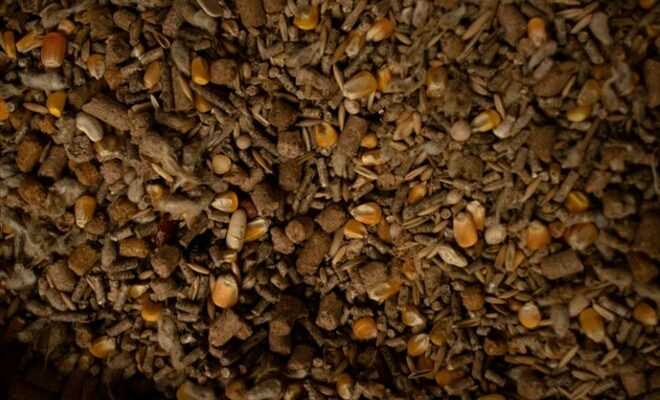Wheat grains on a farm in Spain, March 11, 2022 (AFP / JORGE GUERRERO)
Brussels is preparing aid for farmers to counter the impact of the war in Ukraine, but defends its strategy to green crops by cutting the use of pesticides – a plan questioned by States, MEPs and agricultural organizations on behalf of the “food sovereignty”.
Europe and Africa “will be very deeply destabilized in terms of food” within 12 to 18 months, French President Emmanuel Macron warned on Friday after a summit of the Twenty-Seven, calling for “reassessing the production strategies” of the EU.
The Russia-Ukraine war, two major grain producers, has propelled the prices of oil, wheat, soy, rapeseed, sunflower and corn to record levels and Moscow is threatening to suspend its fertilizer exports on which Europeans are dependent.
Pressed to adopt emergency measures, the European Commission plans to draw for the first time from the “crisis reserve”, a fund of some 450 million euros intended to help farmers in the event of price instability, has told AFP a European source. States and MEPs must agree.
The European executive is also studying possible support, not yet defined, for pig farmers. Finally, the Commission should propose to relax the rules on fallow land, to put it back into cultivation.
On the other hand, from the same source, the Commission remains intransigent on its “From farm to fork” strategy which aims, by 2030, to reduce the use of pesticides by half, that of fertilizers by 20%, and to devote a quarter of the land to organic farming.
– “Nurturing mission” –
At the beginning of March in Brussels, the European Ministers of Agriculture had nevertheless asked the Commission for a “reassessment”: the priority objective is to “liberate the production potential”, “to ensure our nourishing mission (…) for respond to European and global demand”, argued Frenchman Julien Denormandie.
The latter recalled the studies projecting yield reductions of 10 to 15% for cereals, oilseeds, beef and pork, in scenarios integrating the green strategy. “If food security is in danger, we will have to review our objectives and perhaps correct them,” replied Agriculture Commissioner Janusz Wojciechowski.
Since then, the Commission has brought together the experts of its “Mechanism for preparing for and reacting to food security crises” on Wednesday.
However, “it is clear that the EU is not in danger of food shortages, that the immediate impact is rather reflected in higher prices on the supply chain, disrupted trade flows, and consequences for food security world,” according to a report of the meeting. The Commission considers that “food security goes hand in hand with sustainability”.
Brussels highlights the rise of biopesticides, better selection of varieties, changes in diets and stricter criteria for imports, factors not included in studies predicting a drop in production.
-Weakened soils-
But the invasion of Ukraine by Russia has awakened the detractors of this strategy: “The logic of decline from + farm to fork + must be deeply questioned. We must produce more”, insists the FNSEA, the first union French agricultural sector, in unison with the European federation Copa-Cogeca.
Conservative MEP Norbert Lins, chairman of the parliamentary agriculture committee, calls for “temporarily authorizing the use of phytosanitary products” where they are restricted, and the EPP group (conservatives) calls for “postponing all legislative initiatives to pesticides or the restoration of natural areas”.
“Do not think that you will help food production by making it less sustainable”, while the potash for fertilizers comes mainly from Russia and Belarus, replies Frans Timmermans, Vice-President of the Commission in charge of the “Green Deal”.
“Plowing more land, developing biofuels and intensive farming using more pesticides and synthetic fertilizers would considerably increase the risk of ecosystem collapse”, also warn some 90 NGOs (Greenpeace, ClientEarth…).
In France, the Confédération paysanne denounces the “unhealthy opportunism” of the “productivist world”, judging that the exploitation of fallow land and the use of pesticides threaten the quality of the soil and, therefore, production in the long term.
“Producing more is not a guarantee to feed the world: peasant agriculture produces 70-75% of the world’s food on a quarter of the cultivated land, industrial agriculture monopolizes three quarters of the land” of which only a small part is dedicated to human food, says its national secretary Laurence Marandola.
© 2022 AFP
Did you like this article ? Share it with your friends with the buttons below.




